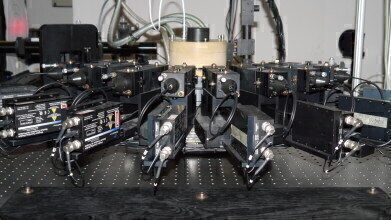-
 Multi-angle light scattering instrument at the JGU Institute of Physical Chemistry, which is a key instrument for the analysis of amphiphile polymer network gels. (photo/©: Georg Conrad, JGU)
Multi-angle light scattering instrument at the JGU Institute of Physical Chemistry, which is a key instrument for the analysis of amphiphile polymer network gels. (photo/©: Georg Conrad, JGU)
News & Views
Polymer Gels under Examination at German Institutes
Aug 05 2019
A new alliance of six German research institutions investigating the permeability properties of polymer gels* has received funding from the German Research Foundation (DFG) of EUR 2 million over the next three years. The researchers will be investigating how the microstructures and nanostructures of polymer gels enable certain substances to pass through their membranes. Soft contact lenses, for instance, must allow the delivery of ions and oxygen to the cornea, which means that they need to ensure the transport of both hydrophilic and hydrophobic molecules.
"Up to now, there has been no DFG-funded research unit on polymers in Germany. Our group will be the first", said research lead Sebastian Seiffert, who has been Professor of Physical Chemistry of Polymers at Johannes Gutenberg University Mainz (JGU) since 2016. The idea sprung from conversations he had with co-spokesperson Dr. Michael Lang of the Leibniz Institute for Polymer Research Dresden during the 2015 European Polymer Federation Congress. "Both of us were interested to find out what kind of heterogeneities exist in a network and how to best control and analyse them," said Lang. "We realised very quickly that we would need a number of different measurement and simulation methods along with a wide range of tests to tackle such a complex issue, which is all the way beyond what the two of us could do. Once we were clear about the specific requirements in terms of measurement, synthesis and simulation that would help us understand the issue in a wider context, we were able to put together a team of seven experts."
The collaboration includes scientists from the Leibniz Institute for Polymer Research Dresden (IPF), Friedrich Schiller University Jena, the University of Stuttgart, Martin Luther University Halle-Wittenberg, and TU Darmstadt.
"Our common goal is to create polymer networks from both water- and oil-soluble building blocks and to combine these building blocks in a controllable structure," added Seiffert. The group plans to obtain a fundamental and systematic understanding of how irregularities occur in a network structure and what kind of role the production process and the condition of the sample play.
Possible further work on designing new materials may then start during a second phase of funding.
*Research Unit 2811 on "Adaptive Polymer Gel with Controlled Network Structure"
Digital Edition
Lab Asia 31.2 April 2024
April 2024
In This Edition Chromatography Articles - Approaches to troubleshooting an SPE method for the analysis of oligonucleotides (pt i) - High-precision liquid flow processes demand full fluidic c...
View all digital editions
Events
Apr 22 2024 Marrakech, Morroco
Making Pharmaceuticals Exhibition & Conference
Apr 23 2024 Coventry, UK
Apr 23 2024 Kintex, South Korea
Apr 23 2024 Seoul, South Korea
Apr 24 2024 Jakarta, Indonesia












.jpg)




